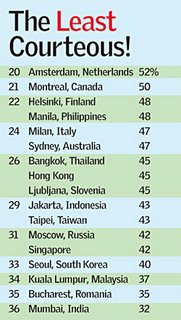 Could You Please Make Me a Shade Lighter?
Could You Please Make Me a Shade Lighter?How Indians came to view fair skin as an ideal--and a business opportunity
By ALEX PERRY
Dec. 5, 2005
Up close, Rajashree Thakur makes a terrible ugly duckling. Her face is a flawless ocher, punctuated by ebony eyes and framed by jet black hair, and in the light of the setting sun, she glows. Thakur plays the lead in India's new hit soap Saat Phere ("seven circles around the fire," a Hindu marriage ritual), which, between riveting digressions into the lives, loves and secrets of a Rajasthani family, is the tragedy of Saloni, too unfortunate-looking for love. "It's not that Saloni isn't beautiful," clarifies Thakur, a former model. "It's that she's dark. Because of her complexion, her family thinks no one will marry her." At today's shoot in the hills north of Bombay, Saloni seeks solace at a temple after another day of dusky humiliation, only to be lectured on the virtues of fairness by a fat, ivory-skinned 9-year-old boy. "Ah, Saloni," grimaces Thakur. "She goes through hell."
The notion that Thakur's skin color could qualify her as unattractive is hard to fathom. Hers is a universal beauty, and in the West, despite concerns about the sun's rays and skin cancer, people spend billions of dollars trying to duplicate her café au lait tone. But Asia, from its geishas to its Ganesha gods, has always prized the pale. And in India the desire is a national obsession. You see it in the personal ads, which range from the general ("Whitish girl invites match") to the pinpoint specific ("Suitable alliance invited for ... fair, smart, only daughter having advanced training in footwear molds designing") but consistently mention the aspirant's light skin. You see it in pharmacies selling Fair & Lovely lightening soaps and creams and--new this season--Fair and Handsome, for men. And you see it in commercials, in which India's top two models, Katrina Kaif and Yana Gupta, are part English and part Czech, respectively. Lightness is big business. Fair and Handsome's maker, Mohan Goenka of Calcutta-based Emami, says the fairness-cosmetics market has grown two-thirds in the past five years, to an annual $250 million. India's 60,000 beauty salons do a roaring trade bleaching faces and blasting skin with tiny sand blowers.
No one can say for certain where this fascination with white skin originated. Thakur and Goenka point to pale-faced conquerors from Britain and central Asia who forcefully instilled a reverence for whiteness. Cultural conservatives complain Hollywood is pushing aside Indian heroes in favor of Westerners all too ready to display their pale flesh. Some sociologists argue that in a country where most people still farm, dark skin is associated with lowly labor in the outdoors.
Cory Wallia is Bollywood's top makeup artist and a man whose cautionary--and perhaps apocryphal--tales on whitening include the time the mother of a bride insisted he slap on so much white foundation that the young girl somehow turned blue. (The punch line? The mother approved.) He believes the real reason for the fairness craze is more troubling than most care to admit. While no one suspects that Westerners seek tans to change their ethnicity, Indians, he says, are motivated essentially to do just that. "Indians are more racist with other Indians than any American ever was with his slaves," Wallia says. "The desire for whiteness has very little to do with beauty."
But fashions--even cultures--can change. Although darkness is still akin to evil in rural India, Wallia says that in Bombay, reflecting its position as the capital of an increasingly cosmopolitan India, dusky is becoming a popular look. Thakur, as her character Saloni, may even be poised to become India's first overtly dark-skinned icon. "People stop me everywhere and ask me, 'Why are you crying so much on TV? It's not fair.'" In fact, says Thakur, the climax of Saat Phere will break another Indian taboo. "Saloni eventually decides she's not going to get married. She is educated, she can sing and dance very well, and she just doesn't consider her complexion a problem." And does the single, dark Saloni live happily ever after? Thakur laughs and says, "Of course. This is Indian TV. Not every rule was meant to be broken."




 Could You Please Make Me a Shade Lighter?
Could You Please Make Me a Shade Lighter?